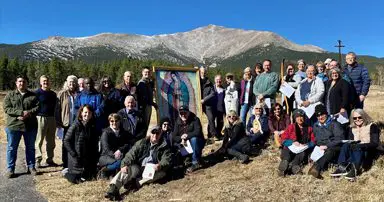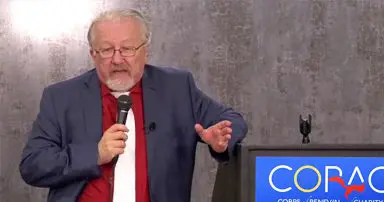By now, everyone knows that Pope Francis has come out endorsing civil unions for homosexuals and their right to create a family. I reckon they are breaking the ice skates out in hell about now.
It is, of course, an affront to all faithful Christians, but I have thought for some time this all signifies something even larger. I think God is sifting each of us. But He is sifting the hierarchy in a very perilous and intimate way. God always accomplishes His will. As is so beautifully promised in Isaiah 55, the Word of God is never without effect. When He sends it out, it never returns to Him empty. When man has grown far from the Lord, when man’s love has grown cold, the Lord prefers that man come back to Him out of love – and so indulges man’s very disobedience and apostasy for a time to give us the chance to return out of love. If we persist long enough and hard enough, then the Lord rains judgment and justice on us. Read the Old Testament with fresh eyes. It is the same pattern over and over. God always gives us enough rope to pull our way back to him or to hang ourselves. Terrifying is the ultimate state of those who mistake God’s patience for His permission – or approval – of their rebellious apostasy. Right now all of us – and the Bishops in particular – are being sifted to reveal who we will serve.
Keep in mind that every moment in time that ever was or ever will be is present to God right now. Throughout the Old Testament and salvation history since the coming of Christ there have been periods of great turmoil and dispute. These are mankind’s turns in God’s winnowing fan. It persists for a time – sometimes years, sometimes decades, sometimes even centuries – and then passes on, leaving us a renewed people with a refined understanding of what God wants of us. Never is there any threat that God is going to be ousted from His throne or that His Church is going to perish. When man’s love grows cold, when his fidelity wanes, errors grow exponentially. God indulges these errors for a time, giving man a chance to come back to Him out of love. In eternity, it is already decreed how it will end. The questions, then, are what does God intend by allowing this sore to fester and what does God want of me.
As I have intimated before, I thought that, after accepting the offering to Pachamama on the altar of Christ, when Pope Francis made clear that he knew what it was and considered it right and proper to accept it there, it opened up a fundamental breach with Christ in the Church. I think, at that moment, the Pope became guilty of formal heresy – and ceased to be recognized as Pope in heaven.
(A brief digression…a person is guilty of material heresy when they subscribe to a position that is objectively heretical. But they may or may not know it to be so, so they do not become excommunicate until they understand the issue at stake. If, knowing the heresy for what it is, they persist in it, they are guilty of formal heresy and are excommunicate. The Church Militant is much less precise in enforcing excommunication than the Church Triumphant. Thus, St. Joan of Arc could be wrongly condemned by Church authorities as a heretic – and a generation later be rehabilitated and ultimately recognized as a saint. But the Church Triumphant always recognized her as a saint – and awaited the humble correction of its error by the Church Militant. This is very bad news for those who think themselves pro-choice Catholics: they may skirt the transient errant judgment of the Church Militant for a time, but the judgment of the Church Triumphant is already sealed against them, unless they repent. And the Church Militant will, in time, come around to the decree of the Church Triumphant.)
Despite that conclusion, I did not – and will not – join the ranks of those who tirelessly seek to depose the Pope or come up with innovative arguments for why he was never Pope in the first place. I take my cue on this from David in his strife with King Saul. David would not become a co-conspirator with King Saul in evil, but he would not strike against the man who, upon becoming king, was anointed by God – for what God anointed was only God’s to depose. It was through the combination of David’s fidelity AND obedience that God ultimately made him king -and Israel a great nation.
Only one Pope that I know of – Honorius – has ever been formally declared a heretic and excommunicated – and that was posthumously. St. Robert Bellarmine, the great post-reformation Doctor of the Church, considered at length the possibility of a sitting heretical Pope, and how such an eventuality should be dealt with. On the one hand, Bellarmine argued, a Pope guilty of formal heresy would automatically be excommunicated and was no longer Pope, for an ex-communicant can enjoy no jurisdiction over a Church he is no longer part of. On the other hand, Bellarmine noted that a Pope is answerable only to God, so there is no council which has the jurisdiction to judge him. Partisans in the divide often emphasize one or the other declarations of Bellarmine at the expense of the fullness of his teaching. Sedevacantists (people who, because of some dispute with the occupant, belief the seat of Peter is vacant – that there is no legitimate Pope) emphasize only the automatic excommunication for formal heresy – and then presume juridical authority over the Pope, which Bellarmine explicitly stated that no one on earth has. Ultramontists (people who believe whoever is the sitting Pope is infallible in all things and has absolute spiritual and political authority) emphasize the lack of jurisdiction over a Pope while ignoring Bellarmine’s teaching on the very real possibility of formal heresy on the part of a Pope.
Bellarmine spent his life expounding on the extent AND the limitations of both spiritual and temporal authority. He counseled the Pope and Bishops to stay away from political questions that they lacked either jurisdiction or competence for and defended the Church’s spiritual prerogatives against assaults by secular authorities. Bellarmine even cautioned Church authorities against condemning Galileo for supporting Copernicus’ heliocentric theory ( long since proven) of our solar system – on the grounds that a condemnation on a subject that, ultimately, the Church had no authority over or competence in, could lead to a huge black eye for the Church and impair public reverence for those areas it DID have authority over. As you might guess, much of my position on such matters is informed by the teaching of St. Robert Bellarmine. Contrary to those who like to emphasize only the part of Bellarmine’s teaching that is convenient to them, I think Bellarmine is informed by the lengthy conflict between David and Saul. We must not collaborate with what is objectively evil, but must not strike who has been anointed by God. I am no expert, but as I read Bellarmine, no council of Cardinals can condemn or depose the Pope. The only thing such a council could conceivably do is declare a vacancy and convene a conclave to elect a new Pope – and Bellarmine seemed dubious about that proposition. As unsatisfying as it might be, he seemed to think that that was up to God – and that we are called to trust that God will take care of it while, like David, living both fidelity to God and humble obedience to the authority set over us. That, my friends, is a daunting task, indeed.
We get down, then, to the two fundamental questions: what does God intend by allowing this turmoil to persist and grow – and what does He want of me?
Everything Hidden Shall be Revealed
I have argued for some time now that in this first phase of renewing the faith of the world, God intends that all things be revealed. I think that process has been going on since the Revelation 12 sign in the sky that happened on Sept. 23, 2017 – and the process now is fully engaged in the hierarchy of the Church. So what is being revealed?
Let us first look at Pope Francis’ recent encyclical, Fratelli Tutti. This is the most disingenuous encyclical I have ever read. There is nothing even close. It is sort of a “beauty pageant” form of theology, bereft of insight or serious purpose. I will just take on three areas of deep deficiency for now.
- It is ahistorical – and reveals that the Pope is alarmingly ignorant of historical facts or intentionally seeks to mislead his readers. First, Pope Francis approvingly quotes several passages from the Koran, passages that sound good, but apply only to fellow Muslims. The Koran has two sets of rules for conflict – one for fellow Muslims and another for infidels. The nice-sounding passages invariably come from the rules for conflict with fellow Muslims. The rule for dealing with infidels is that they must convert or die. You can check it for yourself. The Koran is only about as long as the Book of Psalms in the Bible. Second, the Pope engaged in revisionist history by suggesting that there was no evangelical component to St. Francis’ visit to Sultan al-Malik al-Kamil 800 years ago, only a hope to foster mutual brotherhood. While there is dispute among historians whether the visit was primarily evangelical or diplomatic, both schools acknowledge that St. Francis sought to open the affected area up for formal Christian teaching – a profoundly evangelical purpose. St. Francis succeeded in his diplomatic purpose, as the sultan did allow some formal Christian places of worship in his territories. The Pope’s aspirational hope for brotherhood between the two faiths is a possibility with the Sunni Muslims, who are not terribly enamored of the bloodier commands of the Koran. That hope is not advanced by just ignoring the often violent efforts of Shiite Muslims to enforce those bloodier commands on infidels – and it is fundamentally dishonest to pretend they are not there at all in an effort to evade the central issue.
- It contradicts established Church Doctrine. The Pope unilaterally declares that both the death penalty and war are always, everywhere, and under all circumstances forbidden, contradicting 2000 years of careful formal Church Doctrine on both subjects. He flatly contradicts Pope Leo XII on the right to private property – and does not even attempt to deal with the Church’s teaching on the subject prior to his own ascent to the papal throne. Contrary to what Pope Francis apparently thinks, a Pope may not unilaterally pronounce doctrine except in very constrained, carefully defined circumstances – and this is not one of them. Even in those narrow circumstances, he may never contradict defined Church Doctrine, only develop it.
- It is long on political pronouncements and short on spiritual guidance. On the former, the Pope has little or no authority; on the latter he has heavy, often decisive authority. He pretends to the former. He demands the end to national borders and the taking down of walls (except the one that completely surrounds Vatican City), gives precise instructions on how we are to “care” for the environment (through complete submission to a globalist authority he approves of), and encourages the establishment of a globalist autocracy that will direct us all in how we must behave in an obvious effort to strip us all of the free will which God, Himself, endowed us with.
This is just a thumbnail sketch of the fatal problems with this parody of an encyclical. When skimming through it, I thought that this is what John Lennon’s song, Imagine, would be had Lennon been pompous, tone-deaf, and incapable of coherently explaining an idea (even a wrong one) concisely and coherently. I sympathize with all the commentators who have joined the Sisyphean task of trying, once again, to explain what the Pope really means in a way that does not trash Scripture and Magisterial Church Doctrine. For the first three years of his papacy, I was one of them, for it is a terrible thing to contemplate a Pope that does not share your Catholic faith. At some point, though, it becomes an extended argument over how many Jesuits can dance on the head of a pike (the answer is none – though they can be impaled on it, one by one). Compounding the fact that specific political approaches to fundamental issues are beyond the authority and competence of spiritual authorities is that the political programs offered by the Pope and most of our Bishops are so banal, insipid, and downright absurd. Let me offer a brief digression to illustrate the problem.
Until the rise of the rabid left, all sectors of American society were agreed that the American founders had erected a work of genius in forming our Constitutional system. The real genius, though, lay in the method they used to develop this system. There was no cant (bumper sticker slogans) in their debates over the subject. On all proposals, they looked at both the real benefits and real problems they would entail. Thus, no one advocated pure democracy under the banner of “all people deserve to be free.” They candidly acknowledged that all previous efforts at forming a democracy had degenerated into chaos and a war of “all against all” within a generation and collapsed. So they went about the serious business of finding stabilizers and protections that would allow a free, self-governing people to endure. You cannot lastingly solve a problem without honestly acknowledging the problems with your proposed solution and developing palliatives to those problems. The founders were both practical and humble, taking responsibility for the real-world consequences of their policy rather than stubbornly clinging to abstract ideas long after those ideas had obviously failed. The first American compact was the Articles of Confederation – an over-reaction to relentless British governmental centralization. Within a decade, American statesmen saw that the compact they had formed was so weak and decentralized that it prevented effective action or national unity – so they went back to the drawing board, determined to craft a system that would both defend liberty and actually work. They could not have done it had they not dealt candidly with the facts, humbly accepted responsibility for their acts – both good and bad, and worked to preserve the good while correcting the errors.
Both the Pope and most Bishops Conferences refuse to do this. Three quick examples:
- The Pope’s prohibition against war. Should Europeans in the 1940s have simply rolled over and let Hitler take over the continent rather than resist? Should it have done so 30 years earlier when it was Kaiser Wilhelm who sought to subjugate the same? Is there any difference between aggressor and defender that is worthy of note? The Pope’s prescription would condemn equally both the man who starts beating someone and the one who defends himself from the beating. But the aggressor doesn’t care about the condemnation, so this prescription leaves men and the world defenseless against aggressors. Maybe the Pope envisioned exceptions in his mind – but that doesn’t mean much if he won’t deal candidly with them and speak, as many great saints and Doctors of the Church have throughout Church history, about how to delineate what is just and what unjust without denying people the right to self-defense. This is just insipid virtue-signaling without any actual virtue.
- Open Borders. This is the current default position of the Pope and most Bishops – as the only acceptable means of caring for those in oppressive or impoverished nations. The effect is that spiritual leaders hector wealthy nations while giving a pass to those nations whose policies have impoverished their people, without offering any advice on how to create prosperity. In fact, the Pope’s favored mechanism – authoritarianism – has almost universally led to impoverishment. No nods to reality or history here. In 1991 Pope St. John Paul issued his brilliant encyclical, Centesimus Annus. Though not its primary intent, it was a brilliant and concise exposition of how to create prosperity in every land – and it was directed to every country in the world. Through the principle of subsidiarity, it clearly expounded on how countries should effectively govern collectively while protecting individual human liberty. It held all governmental leaders to account for the decisions they made, while illuminating a path to prosperity and freedom – and was grounded in Scripture and the Magisterium. That was just 29 years ago. Today, the preferred method of dealing with such things by our Catholic hierarchy is to look approvingly on looting and ransacking the already prosperous with no guidance on how to develop the habits of heart and mind or the policies that would create prosperity. The preferred prescription of our current hierarchy would make us all into Venezuela. This only covers one aspect of the problem; the Pope and Bishops similarly do not address at all that open borders is the single most important factor facilitating human trafficking. You can be for open borders and against human trafficking, I suppose, but you are not a serious person or thinker if you can’t see the contradiction involved.
- Health Care. Almost all Catholic religious authorities support some form of nationalized health care, under the guise that all people deserve health care. Again, more beauty pageant critical thinking. All people should have access to health care, but the question is how most effectively to accomplish that goal. Unless you address the significant declines in innovation and quality that have accompanied every nationalized scheme, you are not serious. Unless you acknowledge that such systems invariably create either overt or covert “death panels” that decide who will have access to scarce resources (always made scarcer by nationalization) you are not serious. Unless you envision that provision of health care can easily become a politicized weapon of control by partisan governments, you are not a serious person. I am not reflexively against nationalized health care. Shoot, the founders, by dealing candidly with the real problems historically entailed by self-government, developed an approach that worked and protected citizens from the depredations of a depraved government. Perhaps something similar could be developed with health care – but it can’t without serious people dealing with the real and obvious problems. And I sure won’t support absurd systems that can only take us down in order that some un-serious people can feel virtuous.
Catholic religious authorities think that if they dress up their feckless proposals in scholastic prose (the formal approach of St. Thomas Aquinas and such), it makes those silly proposals elegant and refined. They seem completely unaware that putting lipstick on a pig does not make it elegant and refined. It’s still just a pig with lipstick on. The English translation of Fratelli Tutti is, “All Brothers.” The English translation of the title of this article is “All Smoke and Mirrors.”
There are two fundamental problems in how this has all devolved. First, the Bishops seek to delegate the good they propose to do to an overarching secular government. The early Church did NOT lobby Rome to feed the hungry, shelter the homeless, clothe the naked, care for the wounded and comfort the afflicted. Instead, they built hospitals, schools, relief programs and much more. They undoubtedly knew that Rome did not care what their policy preferences were. The shrewder among them knew that if they enabled Roman power in hopes of coercing it into doing the good Christ commanded them to do, Rome would gladly take on the enhanced power to coerce the Church into doing what the state commanded. This is so obvious and predictable it astounds me whenever a prelate of any sort is surprised when the government mandates coverage for abortion in health policies or seeks to force Christians to violate their consciences on issues of marriage, family and life. Feed the wolf and, when he is strong enough, he will eat you.
The second fundamental problem is more subtle and pernicious. The Church rightly long ago condemned any form of spiritual millenarianism as heresy. We don’t get heaven until we actually get…heaven. Somehow, it has stumbled its way into implicitly endorsing a sort of secular millenarianism: man can create his own heaven on earth with just enough idealism and coercion from elites. Too many Church leaders imagine themselves to be that enlightened elite even while demonstrating the politically analytical prowess of a sophomore – a high school sophomore, not a college student. (Well, perhaps I exaggerate, but only because college sophomores aren’t what they used to be.) Too many in our hierarchy are silly political dabblers and are not spiritually serious. The very term, “pontificate,” means to smugly and self-righteously bloviate on subjects one has little knowledge of or authority over. A sad, but not inaccurate, state of affairs.
The spiritual and secular realms are deeply complementary. In a healthy society, they are intimately intertwined with each area playing its position well – and not trying to intrude on its partner’s position. Church authorities cannot reform secular dysfunction by trying to take the reins and running it themselves – or by delegating its prestige to state actors and presuming to order them what to do. Rather, the Church must focus on spiritual and eternal things, teaching men to seek salvation and giving them the means and sacraments to do that well. When the Church focuses on that, governmental offices are filled with people who, well-formed in spiritual doctrines and focused on salvation, do the good that they can while respecting the right of conscience of those they serve. The Church’s job is to form solid Christians. When it does that well, the ranks of civil authority are filled with solid Christians.
This is not a new thought with me. Back when Pope Francis came to Philadelphia in 2016, I started to become deeply disturbed with his consistent emphasis on the temporal and his neglect of the spiritual. On December 11, 2016, I published a piece entitled, “The Politicization of Doctrine is a Blunder.” It concluded with these two paragraphs:
“This is a time when the spiritual authority and prestige of the Church should be carefully shepherded and guarded. St. John Neumann once encapsulated the heart of shepherding prudence by stating that if a Bishop did not HAVE to speak on a matter, he SHOULD NOT speak on it. I pray that authorities of the Church will not add to the confusion that is rising in the world, but I am aware that some of these things must come.
I have been and will remain a consistent defender of the Church against illicit assaults on its legitimate authority by the imprudent ambition of the polis. But I will also be a consistent defender of the polis against any illicit assaults on its legitimate authority by imprudent clerical ambition.”
St. Robert Bellarmine is not the only Doctor of the Church to write on the extent and limitations of spiritual and temporal authority and how properly they should interact together, but he wrote most extensively and precisely on the subject. The current hierarchy would do well to study him. While few understand it, our hierarchy in a very intimate way, is now in God’s winnowing fan. Best they should reform themselves out of love for Christ and His people. If they do not focus on what is actually their responsibility, there will be wailing and gnashing of teeth.
What Does God Want of Me?
The hierarchy was established by Christ, Himself. Yet from the beginning, some of the Apostolic seats have been held by wicked men. Judas was appointed by Christ, Himself. We hold these treasures in earthen vessels. Christ knew that Judas would succumb to wickedness, so what was His purpose in appointing him in the first place? What did Christ intend to teach us? I think a big part of it was so that we would understand that corruption is ever a part of human nature, even among the most exalted spiritual offices. We need the hierarchy. It is established for our good. Yet would our duty of obedience to the hierarchy the Lord established extend to collaborating with Judas in betraying the Lord – because Judas was an Apostle? Heaven forbid!
I don’t know all the answers by a long shot. But I think God is refining and defining what the authentic apostolate of the laity should be. I think the Lord is clarifying that first of all we are all brothers and sisters under one Lord in the Church, the hierarchy charged with teaching, guiding and forming the faithful in the practice of the faith and the laity acting and living as leaven in the dough to fill the whole world with a Christian conscience. Each of us will be judged by how well we performed the vocation that Christ gave us. I would not work to overthrow the hierarchy, but neither would I become a co-conspirator with Judas in betraying Christ. It is a knife’s edge we all walk now, for God is simultaneously teaching us something deeper while reforming His Church and renewing the faith of the world. We are all going to make some mistakes along our way. Let us be rigorous with ourselves and charitable with others. Those who are right in big things will often be wrong in smaller things while those who are wrong in big things will often be right in smaller things. Even if I am right that Pope Francis is no longer acknowledged in heaven, he is still so acknowledged on earth. We need neither to collaborate in an assault on the faith nor try to strike down the Lord’s anointed. The safest path forward is to always acknowledge God, take the next right step, and be a sign of hope to those around us, even as evil dysfunction rises.
We are all in God’s winnowing fan now. He tests us to see who we will serve. Those who serve the world or their own ambitions will be cast out. It is God who will judge us. As for me, I am determined to serve the Lord and His people as best I can. That is a more difficult task than it has ever been, but navigating these shoals will, in the end, bring us to safe harbor. The ripples from this disordered splash have deeply disturbed the harbor, but Scripture and the Magisterium shall remain, unbroken by the efforts of those outside and those inside the Church to molest them.
To the Bishops I say, keep yourself recollected that you are not primarily politicians, diplomats, administrators or even theologians: you are Apostles of the Living Christ – and will be judged by Him for your fidelity in living His Charge. Remember, He did not hesitate to cast a third of the angels out of heaven. To the rest of us I say, keep in mind that we are the people of God, called to repair our ship when she has sprung many leaks – without scuttling her. Do not be surprised by the fiery trial that has come among us. These things must come. He who endures to the end will be saved – and see the salvation of God.
At the end of his second inaugural address, Abraham Lincoln said, “With malice toward none with charity for all with firmness in the right as God gives us to see the right let us strive on to finish the work we are in to bind up the nation’s wounds, to care for him who shall have borne the battle and for his widow and his orphan ~ to do all which may achieve and cherish a just and lasting peace among ourselves and with all nations.” We would do well to contemplate that counsel now, neglecting neither the call for charity nor the call to strive on to finish the work in which we are engaged. Above all, it is time to get candid and get serious. Though we know it not, we are all giving witness to who we are in God’s deposition chamber right now – and all things will be revealed before judgment is pronounced.




















